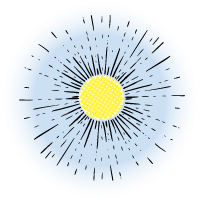Whimsical painting offers glimpse into Riverfront Park’s Looff Carousel history

Felisa Carranza Englund’s life canvas is embellished with tales of romance, adventure and fate. Now in her 90s, the story of her journey as an artist is as intriguing and vibrant as the paintings she creates.
Born in Pina de Ebro near Zaragoza, Spain, in the 1930s, Felisa Englund’s family immigrated to France during the Spanish Civil War where, as a young child, she became enchanted by the magic of carousels or “carrusels” as the word is written in Spanish.
“When I was little, we were refugees in France. They took me to the carousels where we were staying. I never forgot about it,” said Felisa Englund, who was working as a seamstress in Paris when she met and later married Sed Englund, who was from Spokane and stationed in Paris with the Army. The newlyweds relocated to Pullman where they attended Washington State University together. After Sed’s graduation and the birth of daughter Viky, the Englund family resettled on Spokane’s South Hill and expanded to include sons Eric and Mark.
“All of a sudden I just had these dreams,” said Felisa Englund, who had dabbled with watercolors and ceramics over the years and longed to dive deeper into the world of art. In the early 1970s, she enrolled in drawing classes at Spokane Falls Community College where her passion for creativity was further fueled by three words from an art instructor.
“She said, ‘Don’t ever quit!’ I did other things in between, but never quit,” Englund said. “I took classes constantly. I loved it. That was my psychology.”
A chance opportunity to leave her artistic mark on Spokane history arrived a short time later.
In preparation for the post-Expo ’74 opening of the Looff Carrousel in Riverfront Park, Felisa Englund and her SFCC art classmates were recruited to help clean and paint the vintage horses, which had been stored in a downtown Spokane building since the closure of Natatorium Park in 1968. (Another restoration of the horses took place from 2017-18.) While completing the touch up work, she composed a series of black and white sketches of the horses along with her first carousel painting.
“My teacher said, ‘Oh, you have a Picasso style,’ ” recalled Felisa Englund, who later began working on a second painting titled, “Carrusel After Hours,” which showcased her 11-year-old son, Mark, riding one of the same Looff Carrousel horses she had recently spruced up.
“It was really cool,” recalled Mark Englund. “The carousel (painting) was just one of the many things that she did. There was always artwork being painted in the kitchen somewhere and that’s just how it was.
“I think I took it for granted. It was just normal and when I went to friends’ houses, that did not seem normal.”
Felisa Englund’s colorful images of carousels provided a fertile ticket for young imaginations.
She remembered gathering her children together in the living room at night and sharing spirited tales with them about the carousel animals coming to life.
“Mom always had stories … She could see the life and she could paint them (the horses) with all of that energy and moving around and being alive,” said Mark Englund. A frequent visitor to Expo ’74 with her family, Felisa Englund worked on “Carrusel After Hours” well past the end of the Spokane World’s Fair. She was inspired to add more details to her piece in the spring of 1975 as she watched her son Mark riding the same horse featured in her painting on the newly installed Looff Carrousel in Riverfront Park.
Her road to the artistic finish line was a deeply personal experience.
“I consider some of my art, some of the paintings when I really do something different, like a life itself,” Felisa Englund said. “Life, you can get excited about something, it gets very chaotic. I kept going around and trying to find myself. How am I going to finish this? It’s painful. You go through pain when a person paints that way,” she said.
Shortly after completing “Carrusel After Hours,” Felisa Englund was invited to exhibit that painting, along with some of her other artwork, in the U.S. Pavilion at the former Expo ’74 site. She has since earned bachelor’s and master’s degrees in art from Eastern Washington University.
Paintings now cover the walls of the South Hill home Felisa Englund has shared with her husband, Sed, for 60 years. She is bringing the local spirit of “Carrusel After Hours” full circle by displaying the piece as part of a larger exhibit of her works at the New Moon Art Gallery, open 11 a.m. to 5 p.m. Wednesday through Saturday, on East Sprague Avenue.
Englund briefly extolled the key virtue of an amusement park ride that has captivated her heart for nearly nine decades.
“It influences people to be more childlike,” she said.
